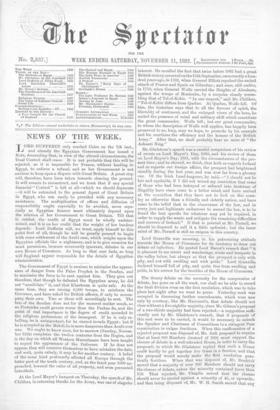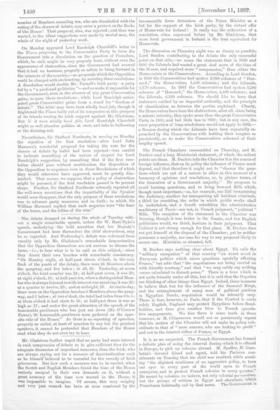The dreary debate on the necessity for the compression of
debate, has gone on all the week, nor shall we be able to record the final division even on the first resolution, which was to take place last night after we went to press. Yesterday week was occupied in discussing further amendments, which were new only by courtesy, like Mr. Harcourt's, that debate should not close without a five-eighths majority, since Mr. Gibson's proposal of a two-thirds majority had been rejected,—a suggestion suffi- ciently met by Mr. Gladstone's remark, that if proposals of this sort were to be carried, it would be necessary to submit the Speaker and Chairman of Committees to a stringent Pass examination in vulgar fractions. When this reaffirmation of a rejected proposal was disposed of, Mr. Salt proposed to require that at least 300 Members (instead of 200) must support the closure of debate in a well-attended House, in order to carry the proposal; to which Mr. Gladstone replied that such a. House could hardly be got together five times in a Session, and that the proposal would merely make the first resolution prac- tically fruitless. When that was disposed of, Mr. proarick moved that a majority of over 200 Members should not carry the closure of debate, unless the minority contained fewer than 150. That rejected, Mr. Chaplin moved that the closure should never be carried against a minority of 40, or upwards ; and that being disposed of, Mr. W. H. Smith moved that auy,
number of Members exceeding ten, who are dissatisfied with the voting of the closure of debate, may enter a protest on the Books of the House! That proposal, also, was rejected; and thus was wasted, in the idlest suggestions ever made by mortal men, the whole of the night of yesterday week.







































